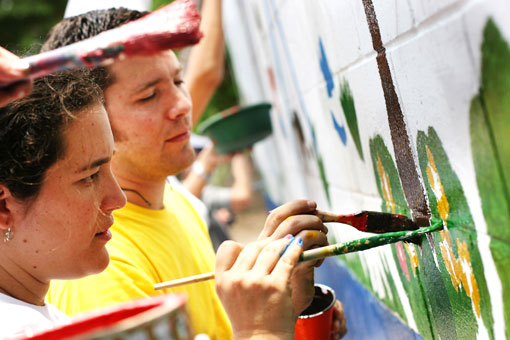Real change begins when communities learn how to help themselves, believe Diego de Sola, his sister Celina, and her husband Ken Baker. This idea guided the three former Connecticut residents to pack their bags and move to El Salvador four years ago to start a small NGO, Glasswing International. Inspired by groups like Habitat for Humanity, Glasswing works in El Salvador, Guatemala and Honduras.
Named after the transparent-winged butterfly native to Central America and Mexico and representing the transparency NGOs bring to development, Glasswing’s efforts focus on education and health. The three founders believe these two areas are most in need of help and have the greatest potential for impact. Unlike the past work of Celina and Ken—former disaster relief workers—the work is not top-down or short-term. The projects are staffed by a corps of volunteers called Crisálida (Chrysalis—in keeping with the butterfly metaphor). The spirit that motivates the volunteers is not one of noblesse oblige. The Crisálida corps attracts the young and old, students and professionals, and representatives from all socioeconomic strata.
According to Diego, who, along with his sister, was born in El Salvador, volunteers’ energy and input build their civic pride, helping “to transform a society where fatalism is prevalent, and to empower people to take their destinies into their own hands.” Recruited locally through churches, civic groups, corporate sponsor employees, the Glasswing website, and word of mouth, volunteers engage in a wide range of activities, from tutoring and raising awareness about literacy to building youth centers and implementing reforestation projects. The formula has attracted close to $3.5 million in private support.
Glasswing collaborates with government ministries of education and health, USAID, other NGOs, universities, and local and U.S. hospitals to train its volunteers. It has also become a resource for corporations seeking to expand or establish corporate social responsibility projects in Central America, including Taca, Microsoft, SAB Miller, and Chevron.
According to Baker, Glasswing’s primary role is to help companies identify local needs, then provide a plan for investment and management of projects. Once those initial factors are in place, the companies then “build up the relationship on their own.”
To date, in El Salvador and Guatemala, Glasswing has enlisted more than 15,000 volunteers in its infrastructure projects, and an additional 300 who are ongoing volunteers in its education programs. After only one year in operation in Guatemala, it already has 600 active volunteers; it is just beginning work in Honduras.
Glasswing’s health initiatives include programs to increase access to medical services, improve the quality of care for children and expectant mothers, and provide specialized training for first responders. Education initiatives include after-school programs for children in kindergarten to ninth grade, including glee clubs, and classes in information technology and financial literacy.
Glasswing’s success in revitalizing communities from within has earned it both praise and continued funding from USAID and corporate sponsors, which it hopes to use to do impact assessments and create new networks in Nicaragua, Panama and Costa Rica.
Celina says one of the most satisfying outcomes of the volunteer corps has been “seeing people from different social classes who may never talk in public—or who have bad feelings toward each other—come together to rally around a common cause.”






